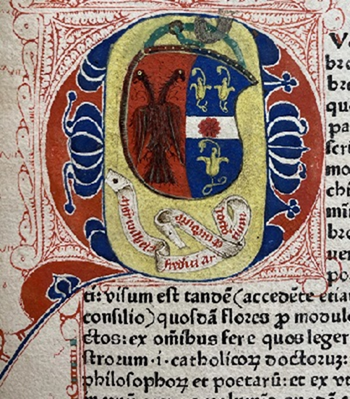
What makes a text a good or captivating English text? How do you recognize repetitions, inconsistencies, faulty logic and other problems in English texts? What does it take to guide a text from writer to reader?
Working with English texts in a professional setting involves a special set of skills. The Writing, Editing and Mediating Master's track (often abbreviated to WEM), offers students a choice of courses that focus on non-fiction and fiction writing for specific audiences, the history of texts in their various forms (from manuscript to digital book), proof-reading and correcting English texts, and producing texts for publication. Topics addressed include censorship, copyright, scholarly editions, and social issues in contemporary literature.
Students on the course typically have a BA in English or in an Anglophone culture (e.g. American Studies). Some students with other humanities qualifications and a sufficient level of academic English are accepted by the admissions board. In all cases, a good background in literary studies is required (60 ECTS)
The one-year Master's track in Writing, Editing and Mediating (WEM) is a track within the Master's degree in Literary Studies and is run by the Department of English Language and Culture. It is taught and assessed wholly in English and focuses on English texts.
The core of the programme provides a solid grounding in the practical and theoretical skills required for editing, translating and writing in a professional context. Students will also have the opportunity to learn about manuscript studies, the history of the book and digital publishing.
| Semesters | ||||
|---|---|---|---|---|
| CoursesCourse Catalog > | 1a | 1b | 2a | 2b |
| WEM 5: Towards the Digital Text, Part A: Book History (5 EC, optional) | ||||
| WEM 6: Poetry Writing (5 EC, optional) | ||||
| WEM 1: Modern Literature and Mediation (10 EC, optional) | ||||
| WEM 2: Modern English Language (10 EC, optional) | ||||
| WEM 3: From Manuscript to Printed Book (10 EC, optional) | ||||
English Literature Tutorials (one or two modules)* (5 EC, optional)
| ||||
| Master's Thesis (WEM) (10 EC) | ||||
| Masterlanguage (English) (one or two modules) (5 EC, optional) | ||||
| WEM 5: Towards the Digital Text, Part B: Digital Remediation and Publishing (5 EC, optional) | ||||
| WEM 7: Creative Nonfiction writing (5 EC, optional) | ||||
| Interdisciplinary Seminar (Literature) (10 EC, optional) | ||||
| MA Placement in Writing, Editing and Mediating (10 EC, optional) | ||||
| WEM 4: Translating and Editing (20 EC) | ||||
As part of the programme, students can opt to complete a 10-credit work placement (an internship). Our graduates have often gone on to work at the same institutions at which they undertook their internships. At the Faculty of Arts, students are responsible for finding a placement for themselves and having it approved by the placement coordinator for their programme.
| Programme options |
|---|
| Master's placement (specialization) This Master's track includes an optional work placement for which you are awarded ECTS credit points. It is your responsibility to find a placement yourself, but the Mobility Office can offer help with this where necessary. |
| Specific requirements | More information |
|---|---|
| previous education |
Students with a Bachelor's degree in English Language and/or Literature or in another literature or culture area taught in English (e.g. American Studies) showing at least 60 ECTS or equivalent in literary studies (literary analysis, literary theory, genres, periods) are admissible to this Master's track. |
| language test |
Additional English language requirement: a TOEFL iBT with a score of 110 (min. of 25 on all items); an IELTS, Academic Module, with a score of 8 (min. of 7.5 on all items); ERK level C1. Cambridge C1 Advanced (level A) or C2 Proficiency with a minimum score of 200. If your BA does not certify this, you may have to take an appropriate language test. |
| other admission requirements |
To assess whether your educational/academic background meets the specific programme requirements, we will consider the level and curriculum of your previous studies. This evaluation is carried out by our Admissions Office and the Admissions Board. |
| Study programme | Organization | Transition |
|---|---|---|
| Engelse Taal en Cultuur | All Research universities | No additional requirements |
| Study programme | Organization | Transition |
|---|---|---|
| English Language and Culture | University of Groningen | No additional requirements |
| Type of student | Deadline | Start course |
|---|---|---|
| Dutch students | 15 August 2025 | 01 September 2025 |
| 15 August 2026 | 01 September 2026 | |
| EU/EEA students | 01 May 2025 | 01 September 2025 |
| 01 May 2026 | 01 September 2026 | |
| non-EU/EEA students | 01 May 2025 | 01 September 2025 |
| 01 May 2026 | 01 September 2026 |
| Specific requirements | More information |
|---|---|
| previous education |
Students with a Bachelor's degree in English Language and/or Literature or in another literature or culture area taught in English (e.g. American Studies) showing at least 60 ECTS or equivalent in literary studies (literary analysis, literary theory, genres, periods) are admissible to this Master's track. |
| language test |
Additional English language requirement: a TOEFL iBT with a score of 110 (min. of 25 on all items); an IELTS, Academic Module, with a score of 8 (min. of 7.5 on all items); ERK level C1. Cambridge C1 Advanced (level A) or C2 Proficiency with a minimum score of 200. If your BA does not certify this, you may have to take an appropriate language test. |
| other admission requirements |
To assess whether your educational/academic background meets the specific programme requirements, we will consider the level and curriculum of your previous studies. This evaluation is carried out by our Admissions Office and the Admissions Board. Students with an international diploma should fill in the checklist. This checklist needs to be uploaded via the Progress Portal when applying for this programme. |
| Type of student | Deadline | Start course |
|---|---|---|
| Dutch students | 15 August 2025 | 01 September 2025 |
| 15 August 2026 | 01 September 2026 | |
| EU/EEA students | 01 May 2025 | 01 September 2025 |
| 01 May 2026 | 01 September 2026 | |
| non-EU/EEA students | 01 May 2025 | 01 September 2025 |
| 01 May 2026 | 01 September 2026 |
After graduating from the MA Writing, Editing and Mediating programme, you will be equipped with academic and professional skills that will prepare you for further study at PhD level and for the job market. You will have developed the ability to:


Hi! I'm Alexandra Versluijs, 24 years old, and a final-year student of the MA in Writing, Editing and Mediating and the Research MA in Classical, Medieval and Early Modern Studies. I specialise in Old English language and literature and have developed a passion for all things editing. During my time in Groningen, I have been a member of NUTS, TJAS and Bernlef.

Hiya :) My name is Sandra, I'm twenty-five years old, and I am a recent graduate of the MA Writing, Editing, and Mediating programme. I am currently working as a freelance writer, specialising in copy and proposal writing.
